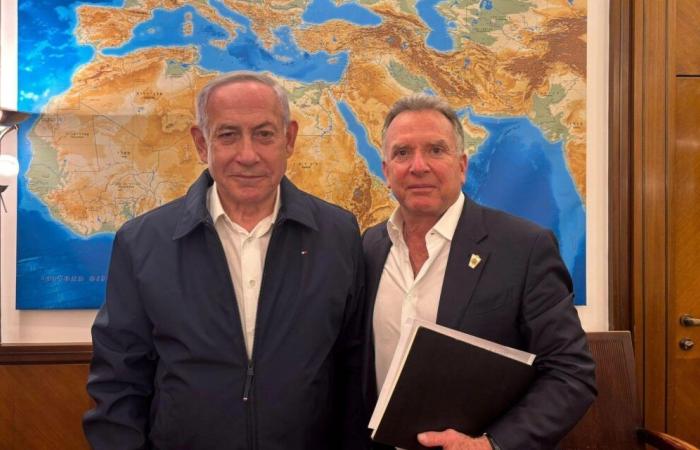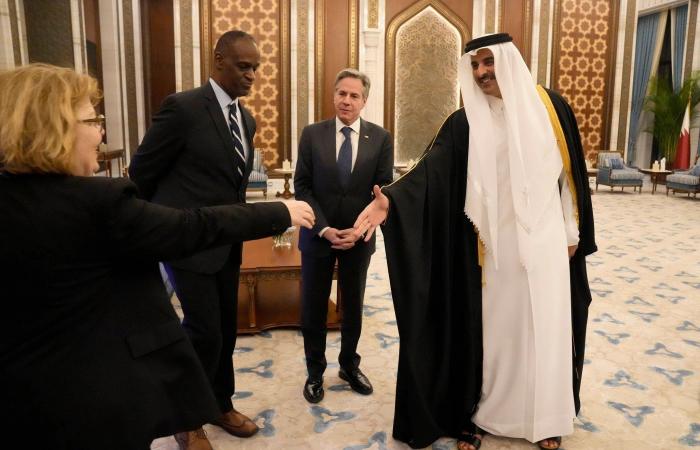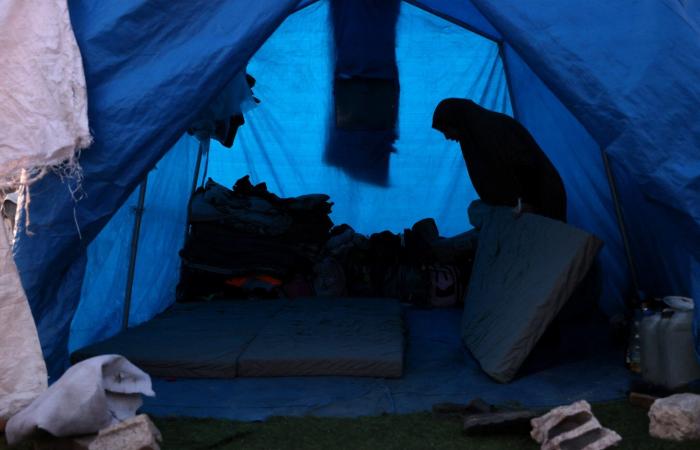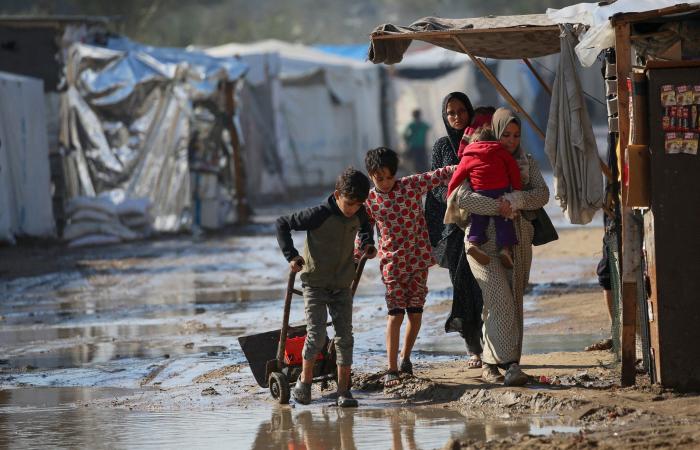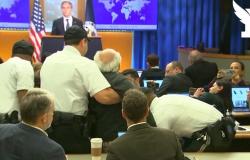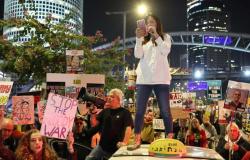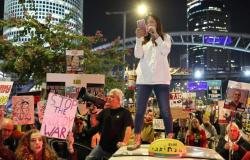The “tense” meeting which took place this weekend between Prime Minister Benjamin Netanyahu and the new envoy for the Middle East Steve Witkoff unblocked the negotiations on the hostages. The top adviser to US President-elect Donald Trump managed to do more to influence the prime minister in a single meeting than outgoing President Joe Biden did all year, two Arab officials at the Times of Israel during the day on Tuesday.
Witkoff has been in Doha for a week, participating in negotiations over the release of hostages currently in the Gaza Strip, as the mediating parties in the talks strive to reach an agreement before President Donald Trump’s inauguration. Trump, which will take place on January 20.
On Saturday, Witkoff flew to Israel to meet with Netanyahu at the prime minister’s office in Jerusalem.
To not miss any of the news,
receive the Daily Headline on your email
By registering, you agree to the terms of use
During the meeting between the two men, the American envoy urged the Israeli head of government to accept the compromises necessary to reach an agreement, compromises of paramount importance, confided the two officials, under cover of anonymity, Times of Israelduring the day on Monday. Neither Witkoff nor Netanyahu’s office responded to our requests for comment.
On Monday evening – forty-eight hours after the meeting in Jerusalem – the delegations of Israel and Hamas, currently taking part in the talks, indicated to the mediators that they accepted, in principle, the proposed hostage agreement , according to the two Arab officials. It now remains for both parties to finalize the details regarding its implementation.
One of the main issues to be resolved is the exact parameters of the IDF’s withdrawal from the Gaza Strip, with mediators still awaiting a map of Israel specifying those parameters, the officials said.
They estimated that an agreement could be announced on Wednesday or Thursday in the form of a joint declaration to be drafted by the United States, Qatar and Egypt, which served as intermediaries in these difficult talks between Israel and Hamas.
Protesters demanding the release of hostages held in the Gaza Strip, outside the Kirya Army headquarters, in Tel Aviv, January 14, 2025. (Erik Marmor/Flash90)
During the day of Tuesday, American Secretary of State Antony Blinken affirmed that Israel had accepted the agreement opening the door to the release of the 98 hostages who are still in the jails of the terrorist group, specifying that Hamas had not communicated his response.
One of the two Arab officials said that the three-phase agreement currently being finalized between Israel and Hamas is largely identical to the proposal that was made by Israel last May.
“A deal could have been reached much earlier but both sides derailed negotiations at different times,” the official said.
He rejected claims repeatedly made by the United States, which repeatedly indicated that Hamas was solely responsible for the failure to reach a ceasefire agreement. He noted that Israel, for its part, had also derailed the talks in recent months – explaining that Netanyahu had distanced himself, over time, from the multi-phased proposal he had agreed to. gave the green light last May. He thus tried to place particular emphasis on the first phase of this offer, the official said, with the aim of giving Israel a guarantee that the IDF could resume fighting in the Gaza Strip immediately afterwards.
Today, both sides have agreed to again support this framework in several phases and they are doing so at the same time – this is probably the first time, noted the Arab official.
The deal has three phases – but provisions for the second phase will not be negotiated until the first phase begins.
Qatar’s Emir Sheikh Tamim bin Hamad Al Thani, right, shakes hands with U.S. Assistant Secretary of State for Near Eastern Affairs Barbara Leaf, left, as the U.S. Ambassador to Qatar looks on , Timmy Davis, second from left, and U.S. Secretary of State Antony Blinken at Lusail Palace in Doha, Qatar, February 6, 2024. (AP Photo/Mark Schiefelbein, Pool)
During the first phase of 42 days, 33 women, children, elderly people and seriously ill hostages will be released. In return, Israel will release nearly a thousand Palestinian prisoners incarcerated for acts of terrorism or endangering national security within the Jewish State. Israel will partially withdraw from Gaza, while facilitating the entry of 600 humanitarian aid trucks into the strip each day.
In the second phase, the remaining living hostages will all be released – and it is expected to conclude with a declaration of a permanent cessation of hostilities. The dead bodies still in the hands of the terrorist group will be repatriated to Israel during the third phase.
On the 16th day of the first phase, negotiators will begin discussing the terms of the second phase. Discussions which will also focus on the framework which will surround the management of the post-war period in Gaza.
The Biden administration had put pressure on Israel, calling on Jerusalem to establish an advance plan laying out the framework for the administration of the coastal enclave which would take over when the guns fell silent. Washington had insisted that in the absence of such a plan and in the absence of a proposal for a viable alternative to Hamas governance, the military gains obtained by the IDF risked being undermined. peril. Netanyahu had largely rejected the idea, saying that planning for the aftermath of the conflict in Gaza was pointless while Hamas was still operational. He also refused the alternative favored by the Americans, who proposed that the Palestinian Authority, headquartered in the West Bank, succeed the terrorist group at the helm of the Gaza Strip.
Unwilling to wait any longer, Blinken delivered a speech Tuesday in which he unveiled a plan for the “day after” in the Strip – a plan he hopes will be adopted by the parties.
While the Biden administration has provided Israel with significant military support since the start of the war, which was triggered by the pogrom committed by Hamas in southern Israel on October 7, it has sometimes sought to influence Israel’s management of the conflict and its behavior at the negotiating table.

A woman prepares bedding inside a shelter in a camp for Palestinian displaced people, in Khan Younes, in the southern Gaza Strip, on December 29, 2024. (Credit: Bashar Taleb/AFP)
Joe Biden administration officials emphasize that they managed to convince Netanyahu to allow the entry of humanitarian aid into the Gaza Strip after the siege imposed for weeks following the deadly Hamas attack. But aid inflows into the Strip have repeatedly collapsed over the past 12 months, with Blinken saying all Gaza residents now face food insecurity.
In October, Blinken and Defense Secretary Lloyd Austin sent a letter to their Israeli counterparts warning that if they did not implement a series of measures to alleviate the humanitarian crisis within 30 days, Israel jeopardized deliveries of American offensive weapons. Israel had not responded to many of the requests submitted in the letter by the deadline – a deadline set shortly after Vice President Kamala Harris lost the presidential election to Trump – but The United States, however, expressed its satisfaction with the progress made by Jerusalem.
Last spring, the United States insisted that Israeli soldiers would not “crush” the town of Rafah, a town in the far south of Gaza, where more than a million displaced Palestinians had sought refuge.
In May, Joe Biden announced his decision not to deliver a shipment of heavy bombs, for fear that Israel would use them in Rafah, with a high number of civilian casualties.
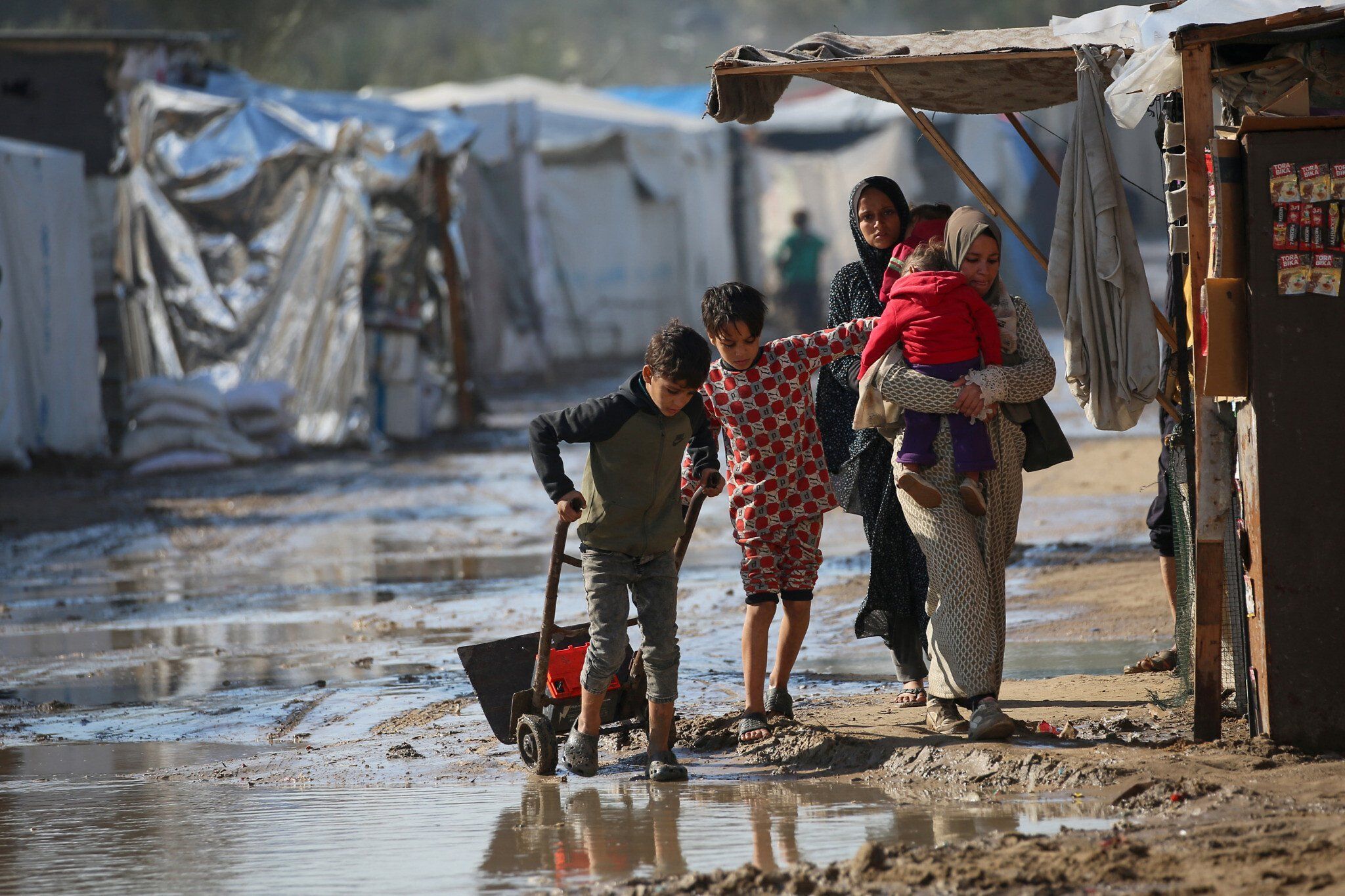
People walking in a flooded area following heavy rains in a camp for displaced people, in Deir el-Balah, in the central Gaza Strip, on December 30, 2024. (Credit: Eyad Baba/AFP)
Biden officials say they had succeeded in convincing Israel to change its military plans to be more civilian-friendly by directing them toward the coastal humanitarian zone, as much of Rafah had been razed in the offensive that had followed and which notably made it possible to kill Yahya Sinwar, the leader of Hamas and the mastermind of October 7, and to destroy tunnels used for trafficking along the border between the Gaza Strip and Egypt.
Other deliveries of such heavy bombs to Israel have since taken place – which attests to the symbolic nature of the decision taken by the outgoing American president.
For his part, a third Arab official, belonging to one of the countries mediating in the negotiations between Israel and Hamas, affirmed that fears of an internal political reaction, while the electoral campaign was in full swing in the States -United, had prevented Biden from openly exerting greater pressure on the government in Jerusalem.
He referred to a meeting between Blinken and Netanyahu in August, after which the secretary of state announced that the Israeli prime minister had accepted a compromise proposal from the United States to the conclusion of a hostage agreement. The Arab official and a member of the Israeli negotiating team told the Times of Israel that this was absolutely not what happened during these talks and that the comments made by Blinken had cast a chill on this series of talks, with discussions that ultimately failed.
Blinken explained to New York Timesearlier this month, that Hamas tended to harden its positions at the negotiating table when it sensed that there were gaps between American and Israeli positions, suggesting that Washington was refraining from publicly blaming Netanyahu regarding the inability to reach an agreement in order not to further damage the talks.

